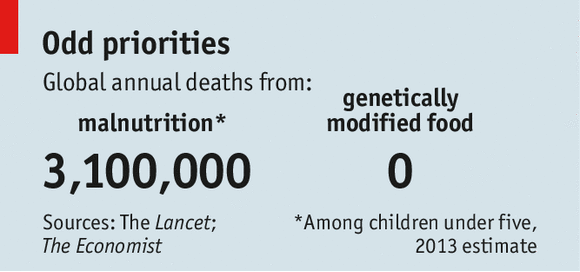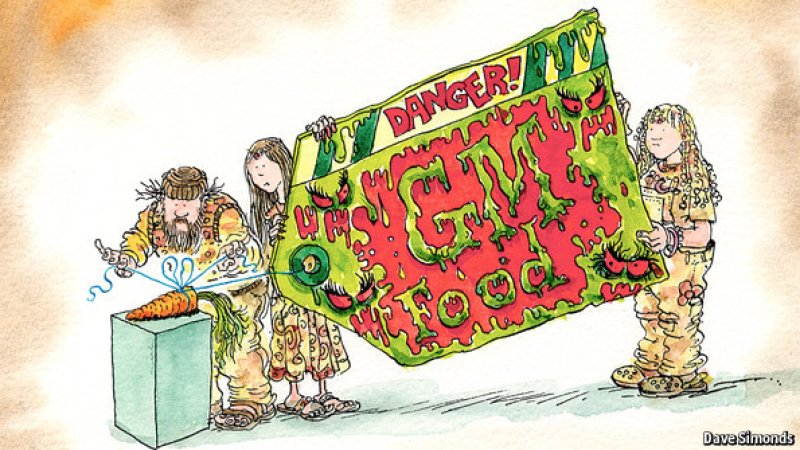Vermont banned slavery before the rest of America, back in 1777, and local greens talk like they have just achieved something comparable. “We’re first again,” exults Will Allen, a delighted organic farmer, as the Green Mountain state prepares to require labeling of foods containing genetically modified (GM) ingredients.
Vermont is a quirky mix: it has strict environmental rules, loose gun laws and America’s only self-proclaimed socialist senator. It also takes its food very seriously, says Andrea Stander of Rural Vermont, a group that advocates a “local food system which is self-reliant and based on reverence for the earth”. Per capita, Vermont has more organic farms than any other state. Montpelier is America’s only McDonald’s-free state capital.
A fitting place, then, for a law designed to satisfy the unfounded fears of foodies. Repeated studies have found no threat to human health from GM ingredients, which are found in up to four-fifths of processed food in American shops; nor have any ill effects appeared during the 20 years in which Americans have been eating the stuff. Indeed, ever since the genetically engineered Flavr Savr tomato reached supermarket shelves in 1994 Americans have taken a more relaxed approach to the technology than much of the rest of the world. Some 64 countries, including the 28 of the European Union, require labelling. America does not, but that is changing.
Rural Vermont’s website has a cartoon depicting GM foods as radioactive mutant creatures with eyes on stalks. But most campaigners downplay the wildest claims about Frankenfoods, preferring to emphasise consumer choice, which is hard for GM food producers to argue against.
If they lobby to suppress information, consumers may wrongly assume they have something to hide. Yet if the government requires labels, consumers may assume that this is an official health warning, even if it isn’t. Europeans shunned GM food after labels were introduced, and many European supermarkets declare themselves (not entirely accurately) GM-free. The same could happen in America. “The activists did a great job of scaring people about their food sources,” sighs Norm McAllister, a farmer (and Republican state senator) who grows GM corn in Vermont.

Genetic modification is one of the most promising tools for feeding a global population that will one day hit 9 or 10 billion. Yet its development depends partly on consumers in rich countries, since the 842m malnourished people don’t have much spare cash. As with other technologies, the techniques honed in rich countries tend eventually to spread to poor ones. But if greens scare Americans into rejecting GM food entirely, that benign process may be interrupted.
Vermont (population 626,000) is small enough that food firms could withdraw their products from its shelves at no great cost. But dozens of states, including California, are considering labelling bills. If they pass, America would have a patchwork of labelling laws, creating a financial and logistical headache.
A legal challenge to Vermont’s law looks likely, possibly on free speech grounds. The bill provides for a defence fund, partly filled by taxpayers. “A $1m lawsuit is nothing to California,” says David Zuckerman, a state senator and organic farmer who supported the bill, “but for little Vermont that would be significant.”
The outlook is unappetising. Food scares are easy to start but hard to stop. GM opponents, like climate-change deniers, are deaf to evidence. And the world’s hungry people can’t vote in Vermont.
Read the full, original article: Vermont v science
Additional Resources:
- “No science-based reason to justify mandatory GMO labeling, study concludes,” Genetic Literacy Project
- “Vermont’s GMO labeling law passed because of well-organized and well-funded campaigns,” Burlington Free Press
- “Media reports on Vermont’s GMO labeling bill lacked science, framed emotionally,” Forbes































